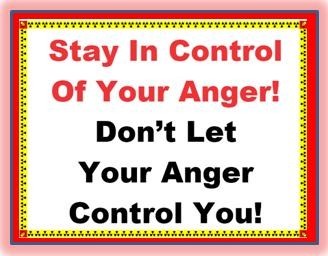Anger Management
We all know what anger is, and we've all felt it: whether as a fleeting annoyance or as full-fledged rage.
Anger is a completely normal, usually healthy, human emotion. But when it gets out of control and turns destructive, it can lead to problems—problems at work, in your personal relationships, and in the overall quality of your life. And it can make you feel as though you're at the mercy of an unpredictable and powerful emotion.

Anger is "an emotional state that varies in intensity from mild irritation to intense fury and rage," according to Charles Spielberger, PhD, a psychologist who specializes in the study of anger. Like other emotions, it is accompanied by physiological and biological changes; when you get angry, your heart rate and blood pressure go up, as do the levels of your energy hormones, adrenaline, and noradrenaline.

Anger can be caused by both external and internal events. You could be angry at a specific person (Such as a coworker or supervisor) or event (a traffic jam, a canceled flight), or your anger could be caused by worrying or brooding about your personal problems. Memories of traumatic or enraging events can also trigger angry feelings.

Simple relaxation tools, such as deep breathing and relaxing imagery, can help calm down angry feelings. There are books and courses that can teach you relaxation techniques, and once you learn the techniques, you can call upon them in any situation. If you are involved in a relationship where both partners are hot-tempered, it might be a good idea for both of you to learn these techniques.
Some simple steps you can try:
- Breathe deeply,
- Slowly repeat a calm word or phrase such as "relax," "take it easy." Repeat it to yourself while breathing deeply.
- Use imagery; visualize a relaxing experience, from either your memory or your imagination.
- Nonstrenuous, slow yoga-like exercises can relax your muscles and make you feel much calmer.
Practice these techniques daily. Learn to use them automatically when you're in a tense situation.

"Silly humor" can help defuse rage in a number of ways. For one thing, it can help you get a more balanced perspective. When you get angry and call someone a name or refer to them in some imaginative phrase, stop and picture what that word would literally look like Do this whenever a name comes into your head about another person. If you can, draw a picture of what the actual thing might look like. This will take a lot of the edge off your fury; and humor can always be relied on to help unknot a tense situation.

Sometimes it's our immediate surroundings that give us cause for irritation and fury. Problems and responsibilities can weigh on you and make you feel angry at the "trap" you seem to have fallen into and all the people and things that form that trap.

Sometimes, our anger and frustration are caused by very real and inescapable problems in our lives. Not all anger is misplaced, and often it's a healthy, natural response to these difficulties. There is also a cultural belief that every problem has a solution, and it adds to our frustration to find out that this isn't always the case. The best attitude to bring to such a situation, then, is not to focus on finding the solution, but rather on how you handle and face the problem
So control your anger with these small tips, and keep in mind that




 CAclubindia
CAclubindia
